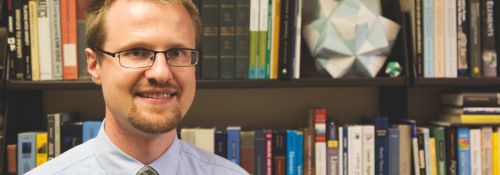
Finding Beauty in Quantum Thermodynamics
Written by Kokko Tso
Some might be surprised to learn that Dr. David Gaebler pursued a degree in Biblical studies after graduating from engineering school. He explains, “I have always been interested in theology. In college, I had this desire to learn the original languages of Scripture, but never had time, so after I got my undergraduate degree in math and physics, I decided to spend some time at a seminary in California.”
Interestingly, Dr. Gaebler sees strong similarities between his mathematical and theological studies. “In math, you spend a lot of time systematically solving equations, and it’s much like the process of parsing a Greek or Hebrew sentence in order to interpret the meaning of Scripture. In many ways, it was a natural continuation—with a slight twist—to my study of mathematics.”
With his background in math and theology, Dr. Gaebler has a unique perspective on the intersection of math and the liberal arts. He believes that the study of mathematics is crucial to a full understanding and appreciation of our cultural heritage. “In many ways, the history of Western Civilization is a history of math and science. Moreover, mathematicians are driven by the same philosophy that forms the basis of a liberal arts education: the study of things that are inherently worth studying and the pursuit of truth for its own sake.”
This very pursuit of beauty led him to the intricate world of quantum thermodynamic systems. He is currently in the process of publishing his dissertation, “Unital Dilations of Completely Positive Semigroups,” in which he successfully developed a mathematical model of a quantum system that preserves unitality and continuity of time dilation while satisfying the conditions of both classical and quantum thermodynamics. This research represents a breakthrough in the study of quantum thermodynamics. Dr. Gaebler remarks, “My research in this topic really embodies what I think mathematicians find so beautiful about our field: the ability to unify ideas that seem far apart from each other. There’s a certain element of surprise and joy in discovering unexpected solutions to complex problems. I’ve never really gotten over the sense of excitement that I get when looking at foundational questions and exploring the axioms from which they proceed.”
Dr. Gaebler hopes to continue his research into quantum thermodynamics with his students here at Hillsdale College. Initially introduced to the College by his wife Leslie, a Hillsdale alumna, he says that he was drawn to the culture of the faculty and students. “There is an abundance of intellectual curiosity here. Even students who don’t really like math are willing to give it a fair hearing and put in the effort to obtain a full understanding of the topics we cover in class.”
For Dr. Gaebler, the interdisciplinary interests of his students creates a rich and unique learning environment. “I personally enjoy literature and philosophy, and I think it’s great that my discussions with students can start off in Real Analysis and wander into Shakespeare.” To students, Dr. Gaebler encourages, “Whether you want to pop in to my office to talk about Hilbert spaces or Anna Karenina, I’m all ears.
Kokko Tso graduated from Hillsdale College in 2013 with majors in music, Latin, and history. He currently works for his alma mater as the Digital Content Manager.